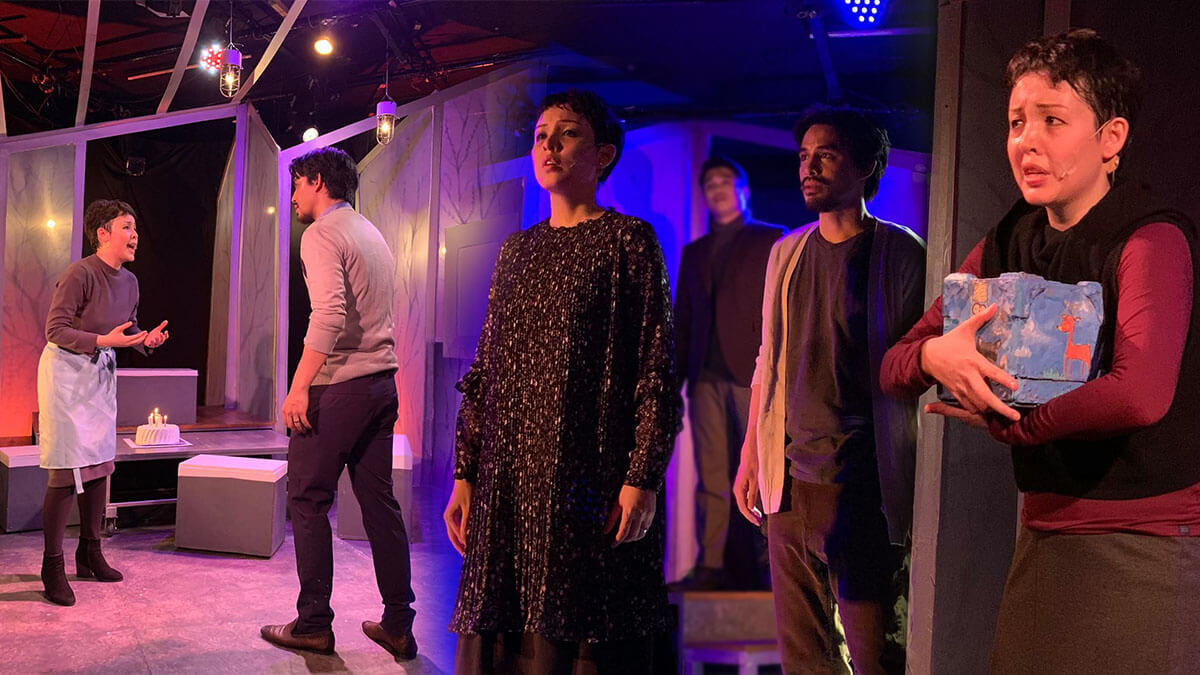Ateneo Blue Repertory’s 28th season finale is now in full swing. We caught the 3pm performance of Next to Normal on March 7 and below is our review.
It is a common thing to take for granted: that very few things are considered taboo in a medium such as theatre. We embrace a myriad of difficult topics from sex, to violence, down to the very morality of man and the human experience. We have seen shows that deal with alternate realities, in worlds shaped by pure imagination. But raise the topic of mental health, and you see show after show of crude, almost comical caricatures of insanity used as plot devices with no real depth or exploration. Dealing with mental issues is difficult, its effects on the people around you are even more difficult to process. What makes this more difficult still is finding a way to talk about it in a way that’s sensitive and compassionate without being pandering. It can easily go from sincere and heartfelt to horribly tone-deaf in a New York minute. Given the massive challenges in putting a show like this on with its complicated topic, it is always interesting to see how different theater companies would mount it.
Much has been written and said about Tom Kitt and Brian Yorkey’s smash hit Next To Normal, which first opened on Broadway to widespread critical acclaim in 2009, winning three Tony Awards for its orchestration, score, and for the amazing performance of Alice Ripley as Diana: a woman who tries to keep her family together despite her condition. We are introduced to her family; her boring husband Dan, her frazzled daughter Natalie, and her son, Gabe, going about their normal, daily life. That is, until it becomes quite apparent that something is terribly wrong. What follows is an emotional journey through Diana’s treatment and how she and the rest of the family cope with the fallout of her condition.
It grows and travels
in an absolutely satisfying
trajectory, from a quiet sense
of dread, to absurd-almost humorous
moments, to an explosive,
terrifying crescendo that leaves
not a dry eye in sight.
In what could be seen as the height of ambition, Next to Normal is onstage once more as Ateneo Blue Repertory’s 28th Season Finale. This intimate, homespun production, directed by Missy Maramara, tells the story of Diana, played in such delicious subtlety by Cris Villonco. Jef Flores, in what could be one of his most nuanced dramatic performances, stars opposite Villonco as Dan. The dynamic between these two characters is even more renounced in Villonco’s tragic portrayal of a woman trying to deal with the effects of her condition and the really difficult choices one must make just to get from one minute to the next. Under Maramara’s direction, there’s a certain level of desperation that’s new to the role, and frankly quite alarming to the audience. It grows and travels in an absolutely satisfying trajectory, from a quiet sense of dread, to absurd-almost humorous moments, to an explosive, terrifying crescendo that leaves not a dry eye in sight. The material itself is oft described as “heavy”, and that’s what Villonco delivers: a substantial weight of character, a meaningful heaviness onstage that is felt more than seen.






Jef Flores is completely sympathetic as Dan, down to how he stands and comes across as the White Knight archetype. When the show starts, it is made clear that Dan has been dealing with the symptoms of Diana’s medical condition for a long time, and the cracks are beginning to show. His calming, soothing, understanding deteriorates over time, which leads him to desperately try to do the unthinkable in the end. It is this deep character flaw, an almost pathological desire to bring things back to the way they were no matter the cost, that drives the plot forward just as much as Diana’s consistent struggle. It is indeed a clever trick, showing the audience a different way of looking at what is established material and making it stick: thanks to Maramara’s direction and Flores’ masterful performance.
Playing the daughter, Natalie, Ateneo freshman Nikki Bengzon is a study in contrasts. Her dynamic range that goes from this sort of neurotic, overwhelmed waif, to being a strong, empowered, and self-possessed young woman by the end of the show is impressive to behold. There were moments when control proved a little elusive in the more emotionally charged scenes in the play, but her musicality and sensitive dramatic performance makes up for it in spades. Tim Pavino plays Gabe, the spectral form of Diana’s first child, with an utter charm that immediately engages the audience. Inhabiting the role of the play’s “mischievous sprite” he fades in and out of Diana’s (and by extension, the audience’s) consciousness, he is the embodiment of life and of the energy that’s missing from her life that Diana craves for. Pavino’s Gabe brings this energy, along with a brilliant vocal performance, but loses the aggressiveness normally associated with other incarnations of the role as he gets momentarily erased from his mother’s memory, becoming more like a beautiful dream, than a metaphor for the crippling sense of guilt that slowly consumes the mind.
Rounding out the cast are Carlos De Guzman, who plays Henry, a stoner classmate of Natalie’s who eventually becomes her love interest. And Jobim Javier who plays the two psychoanalysts in the show. Essentially, they play the same role: that of outsiders to the nuclear family, providing a different perspective as spectators and as alternative sources of support. De Guzman’s laid-back, nonchalant Henry is a direct foil to Natalie’s need to minutely control everything she can as a response to her feelings of neglect and helplessness in the face of her mother’s condition. This apparent lack of any sense of responsibility changes when Natalie spirals out of control, and he finds himself well on the path towards becoming another “Dan”, much to Natalie’s horror. Alternatively, Javier’s Dr. Fine/Dr. Madden represents the multi-pronged approach of psychological treatment, with arguments for and against its more extreme cases. He approaches the role with such earnestness, despite the deep moral questions that his character’s actions take in a sincere attempt to cure her.
Next to Normal is not for the faint of heart. While some may scoff at the trigger warnings posted about the themes the play will tackle, it is important to take note of these. It is not a simple story. It will hurt you in ways that you never thought theatre would. It is not some escapist fantasy where you can come in, enjoy the show, and come out humming its tunes. More than anything, it affects you very deeply, and you will leave the theater with a profound sense of self-inspection: to celebrate loss and misery, along with the joy and happiness one finds as one goes through life. It holds the distinction of being one of the most honest and truthful shows in the form, and spares no expense in showing the ugly along with the beautiful. This version is far from the most polished of the productions I’ve personally seen, but it deserves a place among those that came before it because it has truth. It did not allow its technical challenges to overcome the beautiful brokenness that exists within the heart of the story: A beautiful brokenness that we all should learn to embrace and appreciate.
“Next to Normal” by Ateneo Blue Repertory runs from March 7-22, 2020 at The Fine Arts Theater, Third Floor Gonzaga Hall, Ateneo De Manila University. For tickets, please message (0927) 542.1773 or (0932) 842.9659.
Click here for more stories like “REVIEW: Next To Normal – Beautiful Brokenness”. Make sure to follow and subscribe to our social media accounts: Facebook, YouTube, Instagram, and Twitter.






















